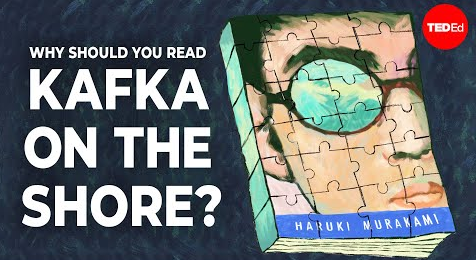"Sometimes fate is like a small sandstorm that keeps changing directions.
“有时,命运这东西就像不断改变前进方向的局部沙尘暴。
You change direction but the sandstorm chases you. You turn again, but the storm adjusts.
你改变方向力图躲避,不料沙尘暴却始终紧紧追随。你再次改变方向,不料沙尘暴也跟着改变。
Over and over you play this out, like some ominous dance with death just before dawn. Why?
如此无数次周而复始,恰如黎明前与死神的不祥之舞。为什么?
Because this storm isn't something that blew in from far away... This storm is you. Something inside of you."
这是因为,沙尘暴不是自远方刮来...而正是你本身,你本身的一部分。”
This quote, from the first chapter of Haruki Murakami's "Kafka on the Shore," captures the teenage protagonist's turmoil.
上文引自村上春树所著《海边的卡夫卡》的第一章,描绘了少年主人公内心的混乱。
Desperate to escape his tyrannical father and the family curse he feels doomed to repeat,
他拼命逃离自己暴君般的父亲,不想重复家族诅咒的命运,
he renames himself Kafka after his favorite author and runs away from home.
他给自己取了最爱的作家的名字“卡夫卡”,并离家出走。
But memories of a missing mother, along with dreams that haunt his waking life, prove more difficult to outrun.
但关于失踪母亲的回忆,以及在他清醒时仍不肯散去的梦境,却令他更难逃离。
Published in Japanese in 2002 and translated into English three years later,
2002年《海边的卡夫卡》日文版出版,三年后被译成英语。
"Kafka on the Shore" is an epic literary puzzle filled with time travel, hidden histories, and magical underworlds.
这是一本充满谜团的文学史诗,充斥着时空穿越、隐秘的历史以及魔法的地下世界。
Readers delight in discovering how the mind-bending imagery, whimsical characters and eerie coincidences fit together.
书中充满奇思妙想的意象,古里古怪的人物和神秘的巧合,各种元素的交织让读者惊叹不已。
Kafka narrates every second chapter, with the rest centering on an old man named Satoru Nakata.
卡夫卡的自述每隔一个章节展开,剩余的篇幅则以一位名为中田的老人为中心。
After awakening from a coma he went into during the Second World War,
从二战时期陷入的昏迷中醒来时,
Nakata loses the ability to read and write, but gains a mysterious knack for talking to cats.
田中失去了读写能力,却获得了能和猫对话的神秘能力。
When he's asked to tail a missing pet, he's thrown onto a dangerous path that runs parallel to Kafka's.
当他受人所托追踪失踪的宠物时,他便踏上了与卡夫卡相呼应的凶险之路。
Soon prophecies come true, portals to different dimensions open up -- and fish and leeches begin raining from the sky.
很快,预言成为现实,通向不同空间的门打开了,水蛭和鱼像雨点般从天上落下。
But what ties these two characters together -- and is it a force either one of them can control?
但是什么连结了这两位主角--是他们两个都无法控制的力量吗?
The collision of different worlds is a common thread in Haruki Murakami's work.
不同世界间的碰撞是村上春树作品中常见的线索,
His novels and short stories often forge fantastic connections between personal experience, supernatural possibilities, and Japanese history.
他的小说和短篇故事往往巧妙地结合起个人经历、超自然现象以及日本的历史。
Born in Kyoto in 1949, Murakami grew up during the post-World War II American occupation of Japan.
春上1949年生于京都,成长于二战后美国驻军日本的时代。
The shadow of war hung over his life as it does his fiction;
战争的阴影充斥着他的生活和小说。

"Kafka on the Shore" features biological attacks, military ghosts and shady conspiracies.
《海边的卡夫卡》中写到了生化战、军人的鬼魂和阴谋诡计。
Murakami's work blurs historical periods and draws from multiple cultural traditions.
村上的作品模糊了不同历史时期的边界,借鉴了多种不同的文化传统。
References to Western society and Japanese customs tumble over each other, from literature and fashion to food and ghost stories.
对西方社会和日本社会的映射此起彼伏,从文学和时尚到食物和鬼怪故事。
He has a penchant for musical references, too, especially in "Kafka on the Shore."
他对描写音乐尤为偏爱,特别是在《海边的卡夫卡》里。
As the runaway Kafka wanders the streets of a strange city, Led Zeppelin and Prince keep him company.
离家出走后,卡夫卡漫步在陌生城市的街道,“齐柏林飞艇”和“王子”陪伴着他。
Soon, he takes refuge in an exquisite private library.
很快,他躲进了一家考究的私人图书馆。
While he spends his days poring over old books and contemplating a strange painting and the library's mysterious owner,
在那里,他日复一日地阅读旧书,并思索着墙上奇怪的画作和图书馆的神秘主人。
he also befriends the librarian -- who introduces him to classical music like Schubert.
同时,他跟管理员成了朋友,管理员使他了解到舒伯特等古典音乐家。
This musical sensibility makes Murakami's work all the more hypnotic.
对音乐的敏感性使村上的作品更具迷惑性。
He frequently bends the line between reality and a world of dreams, and is considered a master of magic lurking in the mundane.
他经常扭曲现实世界和梦境的界限,擅长将魔法隐藏在单调日常中。
This is a key feature of magical realism.
这是魔幻现实主义的主要特点。
In contrast to fantasy, magic in this sort of writing rarely offers a way out of a problem.
与奇幻小说不同,这类文学中的魔法不仅无法帮人解决问题。
Instead, it becomes just one more thing that complicates life.
反倒使生活变得更加复杂。
In "Kafka on the Shore," characters are faced with endless otherworldly distractions, from a love sick ghost to a flute made from cat souls.
在《海边的卡夫卡》中,人物面临着无尽的来自另一个世界的骚扰,从相思成疾的鬼魂,到由猫的灵魂制成的笛子。
These challenges offer no easy answers.
这些问题没有简单的答案。
Instead, they leave us marveling at the resourcefulness of the human spirit to deal with the unexpected.
反之,它们让我们惊叹于人类在面临不可预测之物时,精神能有多强大。
While Kafka often seems suspended in strangeness, there's a tenderness and integrity at the heart of his mission that keeps him moving forward.
虽然卡夫卡经常陷于神秘事件中,他使命核心中温柔和正直的品质,使他能够一直前进。
Gradually he comes to accept his inner confusion.
渐渐地,他接受了自己内心的困惑。
In the end, his experience echoes the reader's: the deeper you go, the more you find.
在故事的最后,他的经历与读者的相同:挖掘越深,收获越多。












